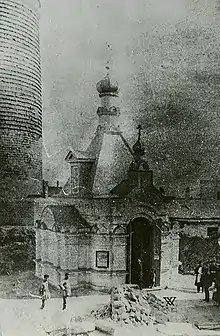Saint Bartholomew Church (Baku)
Saint Bartholomew Church (Azerbaijani: Müqəddəs Varfolomey kilsəsi) was a church that existed in the Old City of Baku, Azerbaijan.
| Saint Bartholomew Church Müqəddəs Varfolomey kilsəsi | |
|---|---|
 Before the destruction of Saint Bartholomew Church | |
| Location | Old City, A. Zeynally st. 67 |
| Country | Azerbaijan |
| Denomination | orthodox |
| History | |
| Founded | 1892 |
| Architecture | |
| Architect(s) | Johann Edel |
| Closed | 1936 |
About
St. Bartholomew Church was built in 1892 at the expense of donations from the local Christian population on the site where the Apostle Bartholomew was believed to have been killed.[1] It is believed that in this area near the Maiden Tower the apostle Bartholomew was crucified and killed by local pagans in 71 AD.[2]
The interior of the small chapel-shaped orthodox church was decorated with icons of Bartholomew and other saints.[3] The church was built by architect Johann Edel in the architectural style of Russian churches. It was built on the foundations of the first and oldest church in Baku. The church continued to operate until 1936, then it was demolished as a part of the campaign against religion.
In modern times, on the morning of June 24, the remembrance day of St. Bartholomew, the Baku diocese performs a moleben at the remains of the church.[4] In 2003, Patriarch Bartholomew I of Constantinople brought some of the remains of St. Bartholomew to Baku as a gift to Azerbaijani Christians, and these remains are now kept in the Holy Myrrhbearers Cathedral.[5] The remains of St. Bartholomew's Church were registered in 2015 as an archeological monument.[4]
References
- "Bakıda məzarı tapılan İsa peyğəmbərin apostolu Varfolomey". qaynarinfo.az. March 23, 2021. Retrieved April 28, 2021.
- "Проповедь Святого Апостола Варфоломея". udi.az. Retrieved April 28, 2021.
- "Часовня святого апостола Варфоломея (Баку)". www.ourbaku.com. August 20, 2011. Retrieved April 28, 2021.
- "ARXEOLOJİ ABİDƏLƏR". icherisheher.gov.az. Retrieved April 28, 2021.
- "KONSTANTİNOPOL PATRİARXI I VARFOLOMEY AZƏRBAYCANA GƏLMİŞDİR". azertag.az. April 16, 2003. Retrieved April 28, 2021.